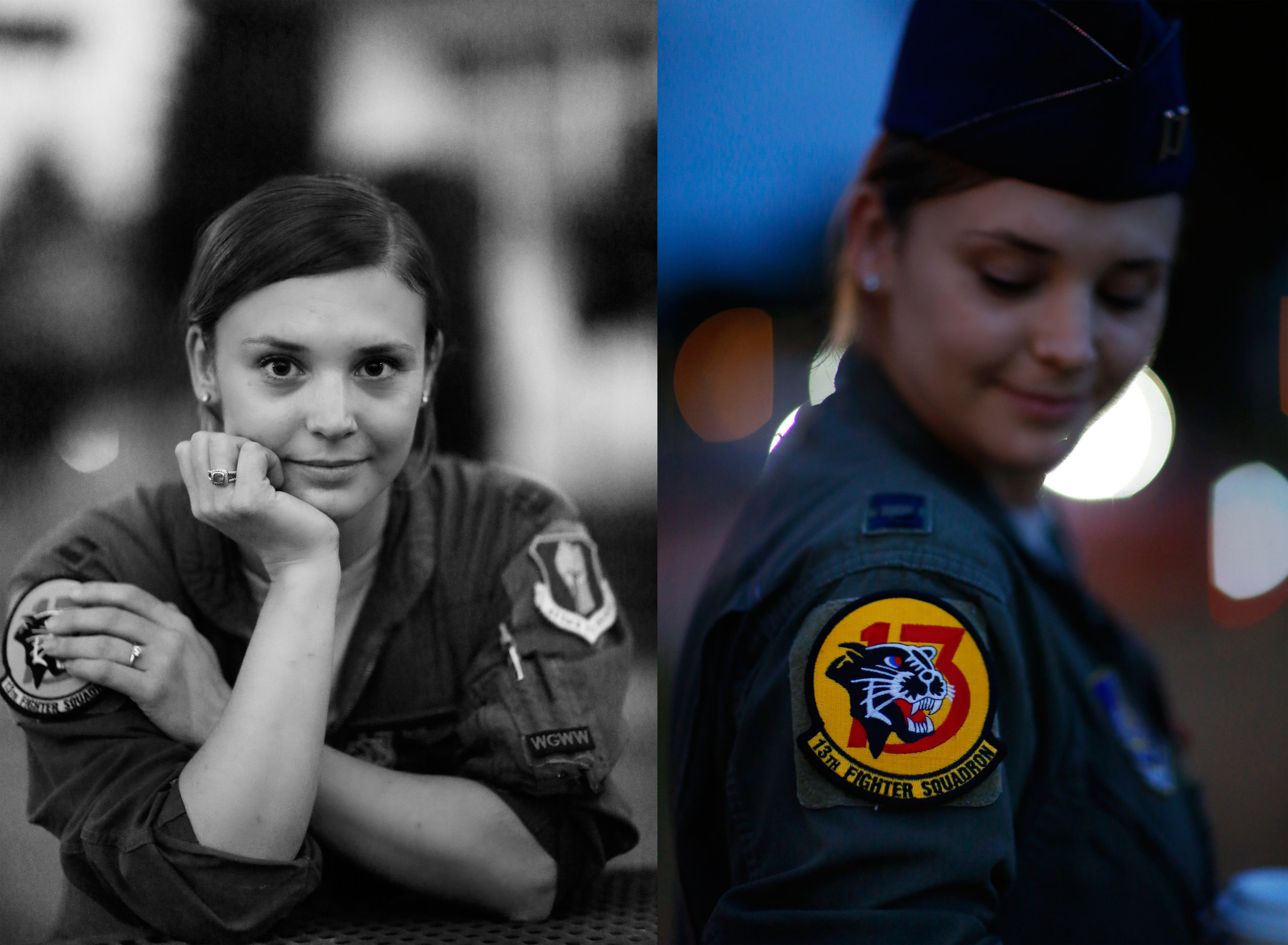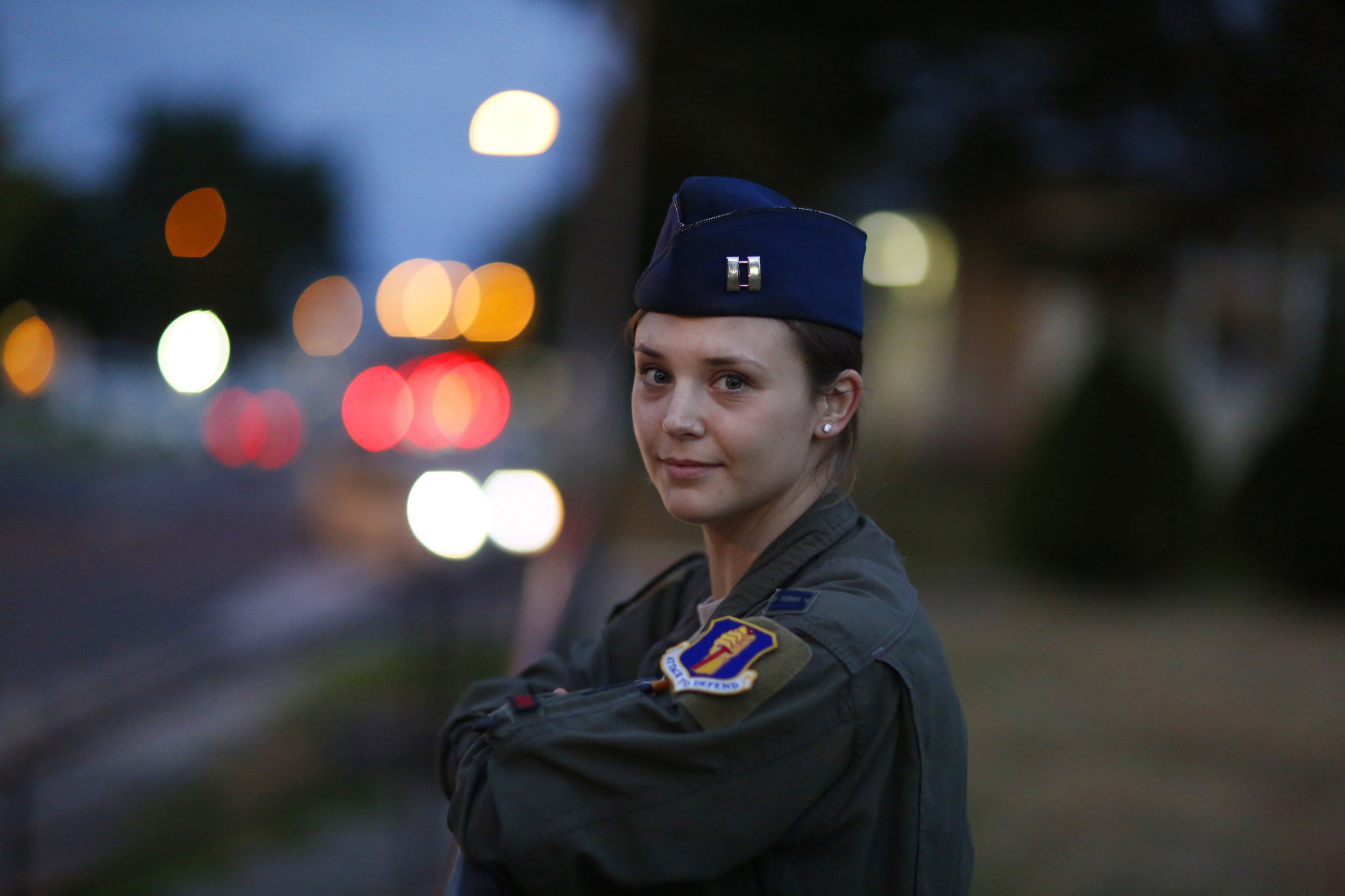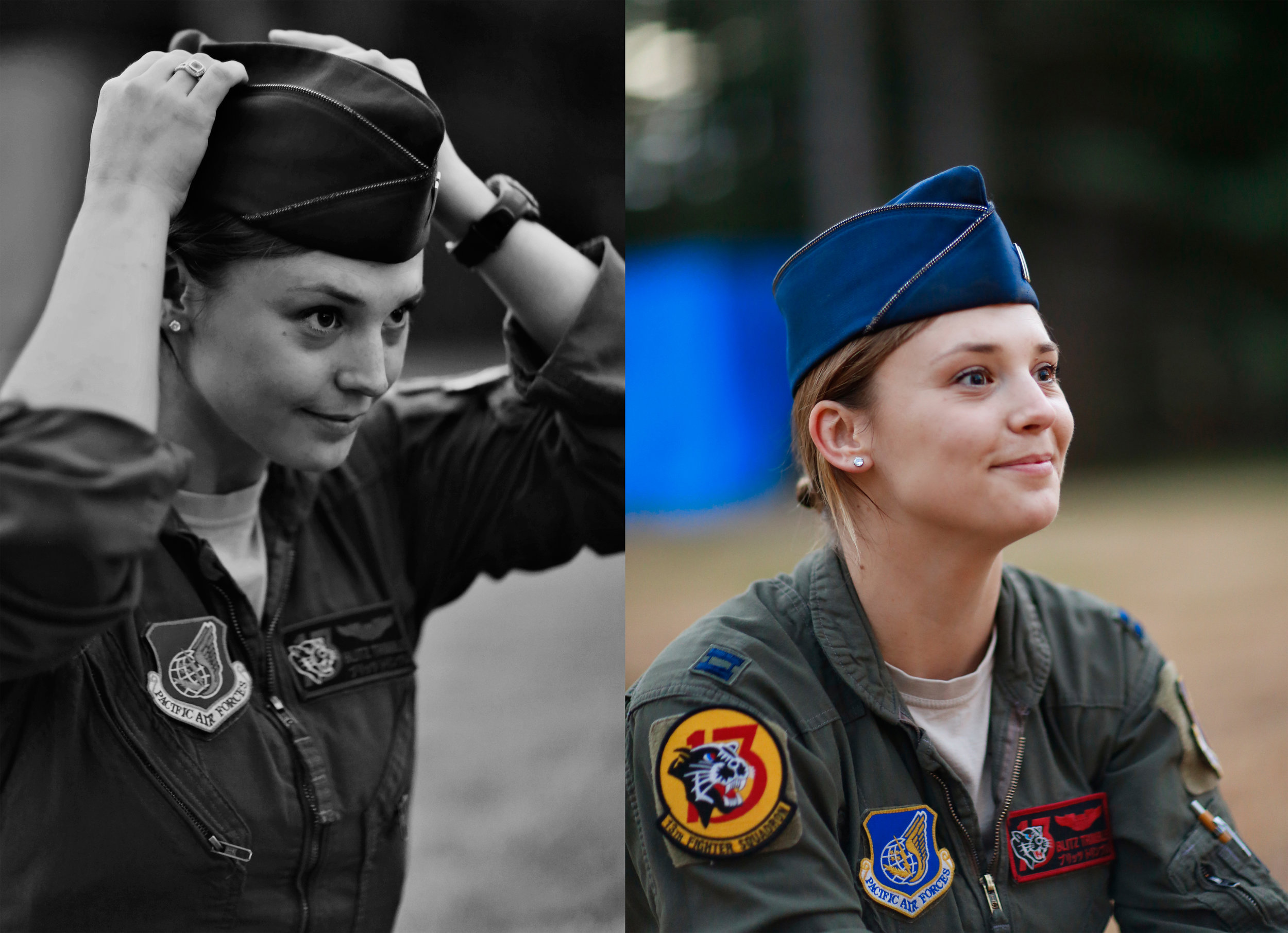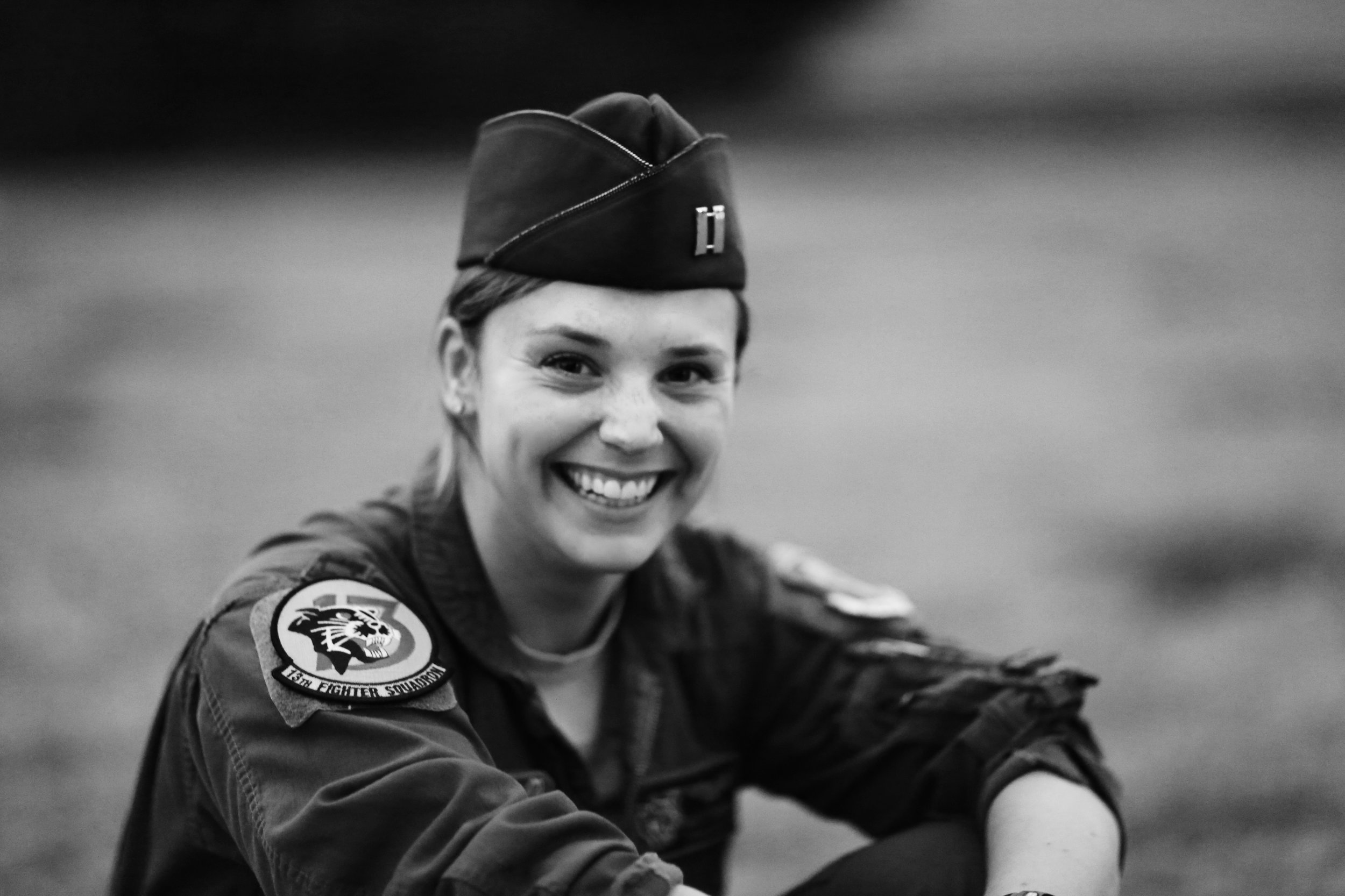Pilot, F-16, Flight Commander, Misawa US Air Base, Japan
An absolute favourite part of the WOW Woman stories is uncovering surprising facts about the women through their writing. Brittany, or Blitz, and I met for a coffee and the conversation was so fluid I lost track of time (as can be seen by the fast-setting dusk in the accompanying images). We rushed outside for some photos and cut the conversation short. As a result, Brittany received a whole additional “bonus” set of questions that I was just too curious to learn about. What is it like to manage men on the base? Does she feel that being a woman helps her in certain situations and hurts her in others? Does she feel the pressure to work harder? Is it difficult to build close mentoring relationships?
This exceptionally bright and thoughtful woman, who is full of contagious energy, ideas and optimism, patiently answered my numerous questions about flying F-16 fighter jets, training other pilots (mostly men) and choosing a career in a very male-dominated field.
And of course I knew that her even-tempered, easy-going and balanced demeanor would come through in her writing. Brittany didn’t disappoint.
1. Name
Capt Brittany Trimble (callsign is “Blitz”). The answers below are my own and don’t necessarily represent the U.S. Air Force’s positions or opinions.
2. Where is your hometown?
Memphis, Tennessee, USA.
3. What is your profession/career/title/self-label/designation?
I’m an F-16 Instructor Pilot and a Flight Commander in the 13th Fighter Squadron at Misawa AB, Japan.
4. What was the journey like to get where you are (in life and career-wise)? What are some accomplishments you’re most proud of, and what was the turning point to set you on a current path in life? If you could describe the motivation behind a dream and a way you achieved your goals, it all weaves such a cool tale, I feel like readers would be interested in that.
My Dad was a backseater in F-4s with the 13FS in Vietnam. From there he went to pilot training and again was assigned to F-4s. He ended up doing a tour in Saudi Arabia, where he met a British nurse (my Mum) who had decided to leave London in search of an adventure. My Dad eventually retired and went on to fly for FedEx in Memphis, TN where I grew up.
I went to an all-girls school in Memphis, so I didn’t have much military exposure there, however my Dad had plenty of stories and photos lining the walls depicting generations of aviation. I think walking by that hallway every day did the most to put the idea of flying into my mind. He never tried to convince me to follow his path, but small things like taking me out with a telescope to stargaze and teaching me how to make paper airplanes added up over time. I then went to Tufts University near Boston and enrolled in AFROTC. Honestly, I wasn’t set on flying, as I didn’t have any experience with it, but I pursued things that kept that door open because I couldn’t shake the feeling that maybe it was for me.
I hit a crossroads when it came time to put in career requests with the Air Force, and that gut feeling pulled me towards pursuing a pilot slot. It sounds like a strange thing to commit 10 years (minimum) of your life to having only tried it once or twice, but it felt like the right choice. I then went to Sheppard AFB for initial pilot training where I met my fiance and learned to fly two AF trainer aircraft (T-6 and T-38).
I’d say the other big turning point was “drop night”, an event just before your graduation where they assign you the aircraft you will fly, all while you’re standing in front of a huge crowd of people. Talk about stressful. It’s quite difficult to transition between different platforms, so this basically determined the trajectory of the next decade of my life.
My #1 choice was to fly the F-16, and the moment when I saw that I got it remains one of the highlights of my life. Now I’m flying with the 13FS out at Misawa, and it feels like I’m close on the trail of my Dad’s footsteps.
5. What did you study in school? But also what you're continuing to learn currently.
I majored in Bio-Psychology at Tufts and loved it. I always joke that it’s totally irrelevant to flying, but I’m realizing more and more that human psychology is a large component of the leadership and management dynamics involved in squadrons. I have a long list of things I’d like to learn (re-learn French, learn a new language, play an instrument, study international relations), but the past few years have been so busy that I haven’t made enough time for them. I’m aiming to make 2019 the year I start again!
At 20 I was at the crossroads between two career paths, neither of which I had any experience with (pre-med and Air Force ROTC)
6. How is your life different from what you pictured at 20?
At 20 I was at the crossroads between two career paths, neither of which I had any experience with (pre-med and Air Force ROTC). My unattainable dream at 20 was to fly the F-16, but it was so many steps away that it seemed unlikely. I had trouble feeling like I was taking active steps towards my goal, but in hindsight the small decisions were gradually building to get me where I am.
7. What was your biggest disappointment and plan to overcome it?
Probably when I washed back a class in UPT because I broke my wrist. I had a solid group of close friends, and we were all going through the training together. Suddenly, that whole group had to move on in training without me, and I was sent to a new squadron with people and commanders I didn’t know at all. I didn’t do a great job of overcoming it; I spent a lot of time in my old flight room hanging out with my original class instead of adapting and forming friendships with my new classmates. It just took some time to acclimate, but really taught me how to accept things outside my control and make the best of a new situation.
8. Advice for other women?
Don’t change who you are to fit a mold of who you think people in your career expect you to be. If everyone did this, we’d end up with a cookie cutter character type everywhere. Show people that you can be unique, as can the next person, and slowly the generalizations will start to fade.
9. Knowing what we know now in current political climate, can women be "all that we can be" in today's world? What is the way forward, as you see it, for "feminist values"?
I think there’s a struggle a lot of women face where we try to be everything simultaneously (hard worker, professional, maternal, sexy, athletic, delicate, the list goes on), but you don’t have to be all of those. And if you try, often the only thing people see is someone who’s exhausted! Eventually that stress leads to a breaking point, so the sooner you define what you want to present to the world and how you want to be perceived, the easier it becomes to get the excess labels out of your cross check. I think a huge shift recently has been about women uplifting other women and support their decisions. I’m ecstatic that culture is shifting to acceptance and understanding, and I think it allows us to gather around each other when we may not share the same views or even beliefs as to what feminism means. We can all start looking out for each other, and that’s a step in the right direction. There is a quote by Rupi Kaur that I like:
“I stand
on the sacrifices
of a million women before me
thinking
what can I do
to make this mountain taller
so the women after me
can see farther
- legacy”
10. Where in the world do you feel “tallest” (i.e. where is your happy place)?
I feel tallest when standing in front of a room full of people, briefing a game plan that I’m confident in for a mission we’re about to fly.
The feeling of knowing that you know what you’re talking about (and that everyone else knows you know as well) is a great confidence builder. It takes a while to get to that point, and I’m certainly not always there, but every now and then it all clicks and everyone looks to you for the answers.
11. What extra-curricular activities/hobbies are you most proud of? Why?
I really enjoy film editing – I don’t have much time to improve techniques/skills, but I’ve made video compilations of my travels across the Pacific for the past few years, and those always bring me joy. I also love writing and am working on revamping a website to tell some stories through.
12. What do you want to be when you grow up? Future goals/challenges?
I see a lot of things I’d like to change in the world, but still get that sense that I had in college of “well it’s so far away that it’s impossible”. I’d like to continue serving in the military and work to change some things that have been lagging behind in my career field. It’s a fascinating time to be a fighter pilot, and there are lots of initiatives to adapt the training to the modern world.
13. What fears are you still hoping to overcome?
Insecurity and impostor syndrome– I can work in a quick-paced military fighter squadron flying fast jets, and I still get intimidated when I walk into the gym with guys working out there! Same thing for meeting kick-ass women; I’m always just in awe and feel like I can’t hold a flame to them, but I have to remind myself that all these people are just human too. They may be just as intimidated by me, so I may as well strike up a conversation.
14. Anything you'd do differently, if you had another go at life?
Not much, other than I wish I’d formed more habits that preserved time for the things I currently wish I had time to do. For example, I love writing, but it’s not a habit I’ve set aside time in the day for. Because of that, I find myself just….not. And I think there was (and perhaps is) a time where I could have fixed that.
People. All sorts. I love when people defy expectations forced upon them. I also find women who are able to be personable, professional, and feminine incredibly inspirational.
15. What inspires you?
People. All sorts. I love when people defy expectations forced upon them. I also find women who are able to be personable, professional, and feminine incredibly inspirational.
16. What are you hopeful about?
My next assignment! I’m moving back stateside for the first time since 2015 and am excited to visit friends and family that I haven’t seen in a while. I’ll also get to instruct some young pilots, so I’m hopeful that I can make a solid impact there as their careers get started.
17. What are some ingredients to a good life?
Sleep, coffee, challenging conversations with people who agree with you and then with people who disagree with you. Not being stagnant.
18. What advice would you give your 14-year-old self?
Everything gets more complicated, so figure out the small things about who you are now and build upon those. Trust your instincts.
19. What are you reading now? (what books do you gift most and what are your favourite reads?)
I’m currently listening to Forged in Crisis, a book about various well-renowned leaders and the challenges they faced. I always recommend The Emperor of All Maladies, a book that biographies cancer, because I think it’s incredibly well-written and provides insight into the human, clinical, and biological aspects of the disease. It also puts into perspective how the history of treatment has been trial and error over generations. Lastly, I love Conrad’s Heart of Darkness or any book by Vonnegut.
20. Who is a WOW Woman in your world who inspires you and why? Can you nominate three or more women you know who perfectly fit WOW WOMAN description?
My Mum (Rachel Trimble) – She was working as a nurse in London just before she turned 30 and got tired of the same scene day in and day out. So she up and moved to Saudi Arabia on a work trip that her friends dropped out of. I am continuously impressed by her sense of adventure and grace. She taught me everything from French to English manners to how to handle a crisis efficiently and logically.
She’s outside of my world as I don’t personally know her, but I have been incredibly inspired by Alexandria Ocasio-Cortez’s recent campaign. She made me realize in a way that I hadn’t before that it’s our generation’s turn to start making change and speaking up about issues that matter to us. It’s so, so easy to ignore tough topics and put on more Netflix or keep blinders on when faced with opposing sides of debates, but I imagine in 60 years when people stop listening to our generation, we will all wish we’d worked to create more solutions.
Another person I look up to (though also out of my world) is Reese Witherspoon. Her Hello Sunshine initiative has told stories of complex, fascinating, and adventurous women that otherwise would have been ignored. She’s proven that those stories are not only compelling but profitable, in an industry that frequently demands financial measures of success. She’s also just fierce. She gave a fiery speech at the Glamour awards in 2015 about not being afraid to admit you’re good at something (it’s well worth a watch).
21. Where can others find you/your work (links to websites, blogs, etc.)?
Instagram: @btrimb
Website: highflightblog.com (Work in progress, still learning but looking to launch by Fall 2019!)
BONUS Questions
Do you feel the need to embody less “feminine” traits to be taken seriously?
No actually, and I think my Dad gave me great advice when he told me that those would ultimately be my strengths. I can cut through a lot of social boundaries that guys sometimes have to operate within and ask someone how things are going or ask personal questions that they may not talk about to other guys. The fighter pilot culture values your skills as a pilot more than other defining features, so that’s helped me not have to choose between the two. As long as I can hold my own flying, the rest is irrelevant.
Do you think you get a presumption of credibility similar to your male counterparts (assuming they do)?
No, honestly. I think one of the challenges of being a female in a male dominated career field is that people often attribute the personality of one person to the whole. So if I have X personality trait, people tend to assume all female pilots have X trait, when we’re all just people too.
Do you feel pressure to work harder to appear as competent as your male counterparts?
Sort of – I feel like when I mess up, it’s seen as much more defining than for others, though that may be entirely self-imposed. So if I have a bad sortie, I feel like I have to compensate because I’ve lost more credibility. When things are going well though, as I mentioned before, everyone judges your flying skills and role in the squadron quite equitably.
Do you have a difficult time building mentoring relationships, either as a mentor or mentee, with males for fear of being misunderstood (i.e. date as opposed to a cup of coffee for networking/insight etc.)
Not as a fighter pilot, though I can see how difficult that must be in a different environment. We frequently work, socialize, exercise, etc all together, so the camaraderie negates any feeling of weirdness. That being said, networking in our career field takes place in those environments, so there isn’t a need (or time) to request a one on one coffee.
Do you find it difficult to balance wanting to be treated like a woman sometimes (whatever that means to you) versus wanting to be treated like a boss?
More so in my relationship than at work! My fiance is also a fighter pilot, so the balance of treating me like a pilot versus doing things like buying flowers or holding doors open is a fun one. It brings up some really good discussions about roles and how to balance those dynamics.
Do you think being a female helps you in certain situations? Hurts you in others? (and similar question: What are the advantages to being a woman in a male dominated industry?)
Yes, I think it does both. It’s much easier to stand out as a female in a male dominated career field, cause when you do really well, people take notice more than with others. That’s a double edged sword though – when you have a misstep, what would otherwise just be an “ah well people make mistakes” for a guy becomes a reflection of your gender as a whole (e.g. “wow apparently women can’t do that well”). I think a lot of this has faded as we get more women in the environment, but we’re not out of the woods yet.
What stereotypes about service men are generally true? Which ones unfair?
I’ve learned more and more that all people are just, well, people. Some are funny, some are awkward, some love to talk, some hate it. Some are jerks, some will help you out no matter what.
I think they also get generalized a lot, much like women do. I’ve learned more and more that all people are just, well, people. Some are funny, some are awkward, some love to talk, some hate it. Some are jerks, some will help you out no matter what. I think the military has a much broader sample of the population than movies and stereotypes lead others to believe.
Do you feel valued by your colleagues?
Yes, there’s nothing like the camaraderie in a close-knit squadron. Everyone brings a small piece of the puzzle, and there’s a noticeable shift any time someone has to move to a new base. Though we each fly our own single ship jets, the missions are never accomplished by just one person carrying the team.
What are your career goals? (in other words, where do you see yourself in 5-10 years from now?)
I hope to still be flying a fighter, maybe in a leadership role, with a family, some established hobbies, and a good balance between all those. I feel like I still have energy for other ventures (easy to say now), but haven’t dreamed those up just yet. I don’t see myself being bored!
I’ve worked to say what I mean once, and if it doesn’t get done or listened to then I follow up once. I’ve learned that I don’t have time to micro-manage other people’s tasks, so trusting people to get things done helps negate some of that.
What are the challenges you face as a female managing men and what has helped you to overcome those challenges?
I think there is a tendency to feel like you’re “nagging” which is such an ugly word. So I’ve worked to say what I mean once, and if it doesn’t get done or listened to then I follow up once. I’ve learned that I don’t have time to micro-manage other people’s tasks, so trusting people to get things done helps negate some of that. I also learned from a mentor that sometimes you just have to let people fail and see the consequences themselves, which I think is a valuable lesson.
Does it matter that you are a female? If yes, why/what?
In the air, no. And that’s one of the things I love about my job--the impartiality of the sky. I think personally and outside the scope of work, it does matter. I’ve seen a lot of positive change in regards to gender perceptions and biases so far in my life, but the road is long, and I’m excited to be where I am right now. I hope to inspire someone to try something they previously wouldn’t have considered because of their gender, and I hope they excel beyond anyone’s expectations.























